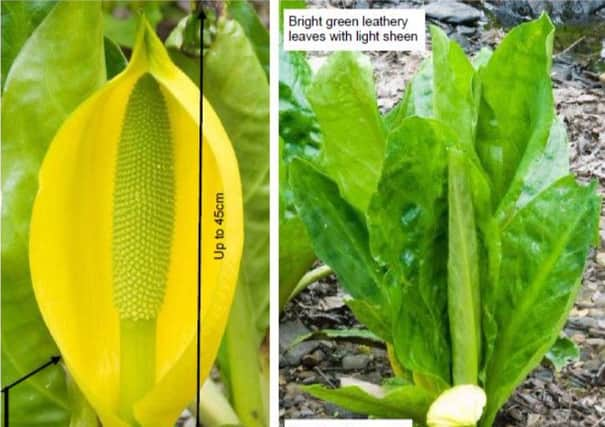Tweed system throws up a bad smell on its riverbanks


Concerns were raised when a plant was spotted on the Upper Tweed near Cadrona last summer and more plants have been traced to an area further upstream between Dawyck and Stobo.
American Skunk Cabbage, or Lysichiton Americanus, is native to North America and is typically a bog dwelling species. It produces bright yellow flowers in early spring, which emit a pungent smell, hence the name.
Advertisement
Hide AdAdvertisement
Hide AdPlants can reach up to 1.5m in height and form dense stands. Due to the size of these plants, they shade out native vegetation and once established in the wild they quickly take over streams and wooded areas.
As they have no natural predators their numbers can get out of control very quickly and the plant has completely smothered streams in neighbouring Dumfriesshire and Cumbria.
Skunk cabbage was widely available in garden centres for use in bog gardens and around ponds, however, its growing presence in the wider countryside has raised concern with many.
A new EU regulation was agreed in December, identifying American Skunk Cabbage and 36 other species as being “of Union concern” due to their highly invasive nature.
Advertisement
Hide AdAdvertisement
Hide AdMembers of Tweed Forum, SNH (Scottish Natural Heritage) and RBGE (Royal Botanical Gardens Edinburgh) are meeting at Dawyck Gardens to discuss their biosecurity measures with keeping these species near a watercourse and how they manage this risk.
There are a number of ornamental gardens locally where this plant is kept. It is not certain where the escapee plant has come from.
The Tweed Forum – which has been running the Tweed Invasives Project (an ambitious large-scale control programme) for 14 years – hopes to educate members of the local community on this species and others, and seek improvements to biosecurity measures currently being undertaken.
An important part of the project is encouraging members of the public to report sightings of these species to Tweed Forum so that a rapid response can ensure that they are not allowed to spread.
Advertisement
Hide AdAdvertisement
Hide AdEmily Iles, project officer for the Tweed Forum, is urging members of the public to be vigilant on the Upper Tweed and report any sightings of American Skunk Cabbage to her on 01896 849723, or by using the Plant Tracker app on a smartphone.